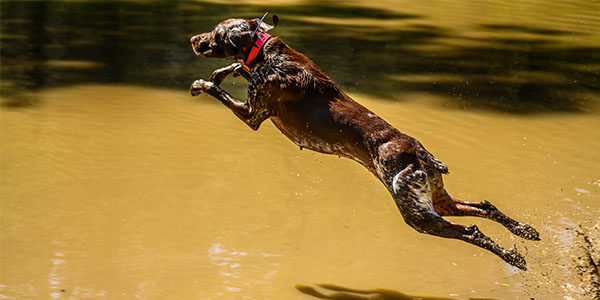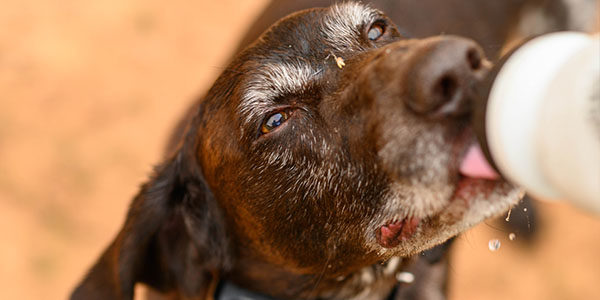
Training and fieldwork creates a special kind of bond between a dog and its owner. But our four-legged friends often find themselves in situations where they need your help. Our new Ask A Vet series delivers advice directly from a professional, working veterinarian. Have a question about your dog? Shoot an email to [email protected] and we’ll dig into the concern.
“I encountered a scenario on the upland opener that scared me. I took my two-year-old Griffon out to chase Huns, and temps quickly reached 80 degrees. Halfway through the hunt, my dog was panting heavily and starting to produce foam around the edges of his mouth. We encountered one covey of Huns where I doubled, and he hesitantly marked one of the birds. From there he shut down and couldn’t care less about birds. The pup was constantly searching for shade and laying down every few steps.
“My dog wouldn’t drink water and acted drunk at times. I finally got him back to the vehicle and dumped all the water I had over his body. I drove him directly to the closest river and thankfully his condition improved by the time we got there. He started drinking water again and was back to normal soon after. Still, what could I have done better? This felt like a close call I don’t want to repeat.” -Morgan Mason
You did an excellent job recognizing the early signs of heat exhaustion, and your timely action likely prevented a complete disaster for you and your bird dog. As an avid upland hunter, I empathize with the desire to burn boot leather early in the season following a long wait for opening day. Bird dogs share this same enthusiasm and often hit the ground with plenty of pent-up energy.
Keeping your bird dog cool and properly hydrated should be your top priorities early in the year, even if it means sacrificing an epic outing in the field. Temps in that range make it incredibly difficult for a dog to manage their internal temperature to healthy levels.

Canines rely on heat dissipation primarily through panting, as they only have sweat glands on the pads of their feet. The unique physiological process of panting exchanges cooler ambient air with moistened surfaces of the respiratory tract. And while it’s an efficient means of keeping a dog’s body temperature regulated, panting comes at the expense of significant fluid loss through evaporation.
One of the major concerns of heat exhaustion is that clinical signs can be subtle and delayed. Keep an eye out for excessive panting, disorientation, and lethargy. These early symptoms can quickly progress to permanent damage of vital organs, bringing an end to more than just your dog’s hunting career.
Seizures, vomiting, or collapse are signs of severe heat-related injury and should be addressed immediately by a veterinarian who can help safely rehydrate your dog with IV fluids. It’s a diagnosis I’ve made several times, and unfortunately for the recipients of this grave prognosis, it was preventable in almost every case.
Preventing overexertion and recognizing the signs of heat-related injury are as critical to your success afield as choosing the best blind or plumb thicket. The first step is tempering expectations for those first few outings. Short-and-sweet should be the theme for early season hunts, especially if your summer conditioning program hasn’t kept your dog in shape. Hunters should limit their outings to early morning or late evening hours, and should plan their upland routes around established watering areas for swim breaks.

Continuous hydration for dogs is critical in the heat. Stop for water every 20 minutes (set your phone timer if you have to). If you own a stubborn workhorse of a bird dog, keep a squeeze bottle in your pack. It’s the dogs that would rather keep hunting than drink that I’ve seen most often in the clinic for heat-related injuries. A few bursts of water in the corner of his mouth will force him to replace some of the fluids lost to evaporation. But take it easy: Dogs that are already lethargic from the heat have a delayed swallowing reflex and could aspirate water.
It’s up to you, the bird dog handler, to ensure that the dog’s hydration needs are met. Do not rely solely on your hunting companion to tell you when it’s time to water up, as dogs don’t sense that they need to drink until they’ve lost almost a half percent of their body weight in fluids.
Dogs can also benefit from evaporative cooling on their skin even though they don’t sweat. I douse my dogs’ ears, neck, and armpits with a conservative amount of tepid water from my drinking stash if no standing water is available. These areas of the body act like radiators by bringing blood close to the surface of the skin for rapid cooling.
I routinely emphasize with clients that prevention is far superior to medical treatment in these scenarios. If your pup is spending more time at heel than out in front pursuing birds, blowing coveys, or showing reluctance to retrieve a marked bird, water up, cool them off, and call it a day. The hunting is only going to get better later in the season.




Conversation